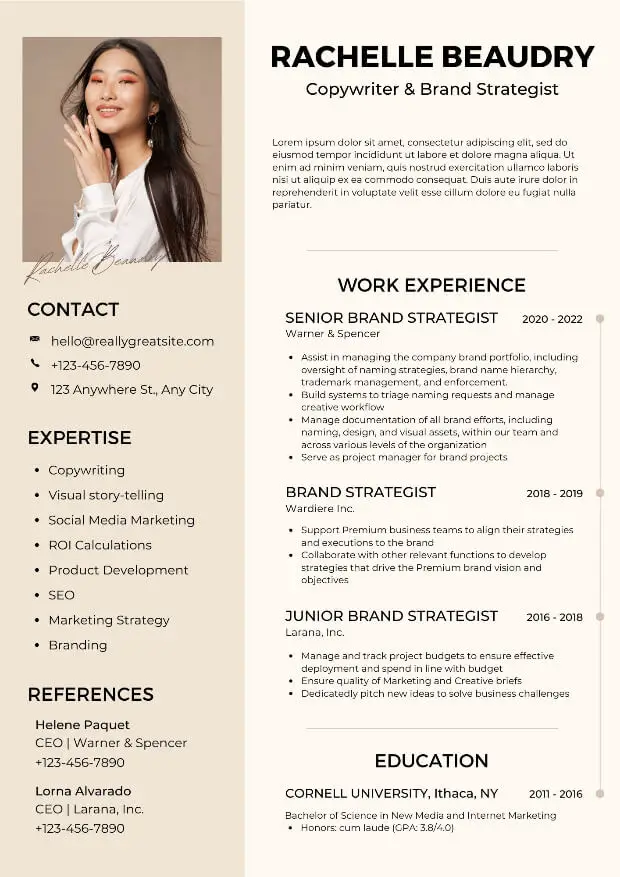In this lesson, we will discuss how to write an effective CV for your dream job. In the world of job applications, your CV is one of the most important things to get right. A well-written CV can help you stand out from the competition and secure that interview with a prospective employer.
On the other hand, a bad CV will do exactly the opposite. It’ll make you seem unprofessional and will probably lead to rejection. So what separates a good CV from a bad one? Let us know elaborately.
What is a CV?
Quick Navigation
The term ‘CV’ stands for curriculum vitae. It is a brief overview of your skills and achievements. A CV is typically used in job applications and interviews to provide information about who you are as a candidate for the position. It shows why you can do the job better than others.
To be successful, your CV should demonstrate that you have the right experience, skills, knowledge, qualifications, and education to meet the employer’s needs and requirements.
10 tips to Write an Effective CV for a job
Take a look at this step-by-step guide to writing an effective CV for your dream job:
1. Find a perfect format for your CV

Not sure what to include in your CV? Get ideas from other professionals by looking at sample CVs online. Whatever you do, make sure that your CV follows a consistent format and is easy to read and understand. Vague terms like responsible for or developed could result in your application being thrown out before it’s even been considered.
And never lie on your CV—if a potential employer finds evidence of deception, they won’t hesitate to terminate negotiations immediately. This can be just as bad as not applying if it means not getting a foot in the door for that dream job! To avoid making costly mistakes, it pays to do some research upfront.
2. Make sure your contact details are up to date
If your CV isn’t up to date, you will not be considered for job opportunities. Make sure your contact details—phone number, email address, and any special skills you want hiring managers to know about—are correct in every place they appear on your resume.
It’s also important to make sure each CV version is consistent with all other versions. Get everything to proofread: You may have excellent spelling and grammar skills, but even if you do, it doesn’t hurt to have a second set of eyes look over your work before sending it out into the world.
Reading a document closely (especially one filled with numbers) requires focus and concentration that many people don’t always have when reading over their work.
3. Craft your headline
The headline of your CV will be one of your first chances to make a good impression on a prospective employer. Ensure it is well-written and includes keywords that reflect what you are applying for.
If you are applying for a job in sales, for example, consider highlighting some key metrics like sales volume or revenues. Don’t forget to include your contact information so employers can reach out if they have any questions about your work experience.
Write a headline that includes effective, which will relate to all of your readers. Your headline should also be relevant to what you have written in your summary and introduction. Make sure it is readable so people can find out how to write an effective CV from you. Write a clear, simple, memorable line, but don’t overdo it.
4. Design your CV for the job
When writing your CV for a specific job, it’s essential to tailor it toward what that employer is looking for. By researching the company, you’ll better understand precisely what they’re looking for. If necessary, call your contact at that company and ask what specific details they’d like to see on your resume.
You might also find it helpful to show two versions of your CV—one tailored to just one job and another version with all jobs listed chronologically. The former is more impressive as it showcases just how dedicated you are!
5. List only relevant information
Ensure that you include only relevant information to your career field in your CV. You should also ensure that each section consists of your educational, vocational, and professional experience and any awards or commendations.
Including irrelevant information takes up valuable space on your document and dilutes its effectiveness. As a rule of thumb, it’s best only to include information that would directly apply to a position you may apply for.
6. Be honest with yourself
One of our biggest tips for writing an effective CV is honesty. Don’t exaggerate your qualifications; don’t try to cover up an inferior degree by fudging on some minor details.
Employers can quickly check if you have an education or a degree you didn’t say you did—and it won’t affect your chances of getting hired. If you have enough experience, writing a good CV should be relatively easy, so don’t waste time trying to pull something over on anyone.
7. Keep it short but not too short
More than two pages are too long. Some recruiters report they will not even look at CVs on multiple pages. Never leave out your contact information, qualifications, or employment history (chronological, by place).
Several online templates are available to ensure you write an effective CV that sticks to one page. If you’re searching for a job, ensure a clean and professional-looking resume before submitting your application to employers.
Plus, proofreading is essential because mistakes are considered unprofessional in any industry; it shows that you don’t care about what you’re applying for and who will be hiring you. Also, make sure your resume has no typos or grammatical errors!
8. Use clear language and headers
There’s nothing worse than reading a CV that looks like it was written by someone who doesn’t understand how to write. And if you want recruiters and hiring managers to spend more time on your CV (and less time clicking through to others), make sure your writing is clear, concise, and easy to navigate.
This means using headers at appropriate points and summarizing each section. Just as with regular business writing, a CV is no place for overly-fancy language or jargon; keep things simple and use active words that paint a picture of what you can do for a company, not just what you have done.
Recruiters don’t have much time or patience; they need to know quickly whether they should read further into your CV.
9. Save space by using bullet points
Use bullet points to convey your experience. Don’t worry about indenting. Bullet points are more accessible to scan than a paragraph of text, so make use of them. A bulleted list allows employers to find key information faster, which is more convenient for them and gives you more space in your CV for those all-important bullet points highlighting your skills and experience.
A CV is about marketing yourself and effectively presenting yourself. When writing it, you want it to be as concise as possible, but that doesn’t mean ignoring important sections or leaving out vital details just because they will take up valuable space on a page; they still need to be included, make sure they are appropriately squeezed into a section designed specifically for them.
10. Don’t copy examples from other people
There’s nothing wrong with looking at CV examples to help you get started. It can be complicated to know where to start, so why not look at other people’s CV’s for inspiration? But don’t copy from one example and apply it directly to your CV – it may not be appropriate.
Take what you like and make it work for you, keeping in mind that every application is different, so no one has a ‘one size fits all solution when writing an effective CV.
The end goal of every CV is to get you in for an interview. We hope these CV writing tips help you create a powerful document that gets you noticed by recruiters and hiring managers.
You may like these useful links:
10 Proven Methods To Learn English At Home
10 Reliable Essay Writing Tips That Will Get You Accepted
10 Simple Ways to Prepare for IELTS at Home
7 Best Punctuation Checkers for Free
8 Professional Business Email Writing Tips

Azizul Hakim is the founder & CEO of englishfinders.com. He is a passionate writer, English instructor, and content creator. He has completed his graduation and post-graduation in English language and literature.





